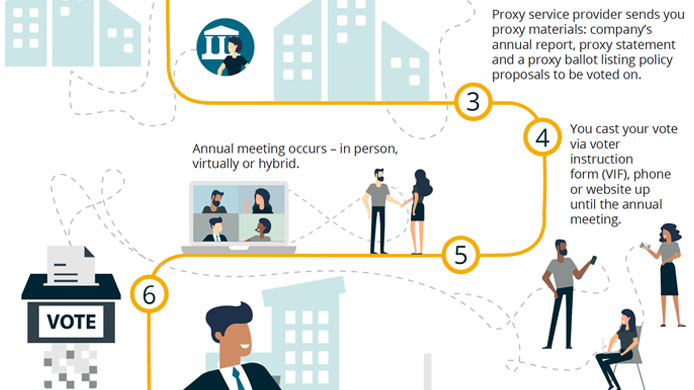Mediant's Guide to the Beneficial Shareholder Voting Process
November 09 2021 / 2 Minute Read
How well do your retail brokerage clients understand their rights as shareholders and the voting process for exercising them?
Our Capabilities
We believe the financial services ecosystem should seamlessly interconnect, without compromising quality or cost efficiency.
Who is BetaNXT?
We invest in platforms, products, and partnerships to accelerate growth for the ecosystem we serve. Our connective approach empowers clients to deliver a comprehensive solution.
Read MoreEngage With Us
Transactions utilizing special purpose acquisition companies (SPACs) are more popular than ever. In the first four months of this year, SPACs, also referred to as blank check companies, accounted for about one-fifth of all U.S. merger and acquisition transaction volume, according to SPAC Insider statistics. Market watchers expect SPAC-sponsored IPOs to keep pace with this rate throughout 2021, with increased deals in the international space.
If you're a so-called SPAC "target company," like Richard Branson's Virgin Orbit (VO), you already know that a SPAC business combination brings almost instant capital upon completion. VO, which is expected to merge with blank check company NextGen, will receive $483 million of quick capital in the deal, resulting in a $3.2 billion public company upon completion, according to a report from Tech Crunch.
What you may be less fluent in is the series of events called the de-SPAC. As the target company in the de-SPAC, your organization and the SPAC must, among other responsibilities, convey the transaction benefits to the SPAC's shareholders to gain approval of the deal. This requires a special shareholder meeting.
At the core of this approval is the pre-closing shareholder vote event. Upon the execution of a letter of intent by the deal sponsors, shareholders of the blank check company must vote to approve any merger or acquisition agreements made by the parties to the agreement. This critical vote has two possible outcomes:
Given these potential consequences, you'll need to pay close attention to your de-SPAC event to ensure your major shareholders are engaged and reach the quorum needed to avoid having to adjourn the special meeting. You must address everything from determining your special-meeting format to conducting analyses during and after the vote.
The sponsors, transfer agent, solicitors, and attorneys working out the deep details of the deal typically don't have the time or institutional knowledge necessary to manage their own de-SPAC—nor should they. Fortunately, a single source, end-to-end provider, such as Mediant, can guide you through the de-SPAC process, while ensuring that your company masters best practices in its post-SPAC life to remain in compliance with all reporting rules and regulations.
What makes the de-SPAC an especially complex process to manage is its compressed timetable, relative to a typical proxy event. When you engage with a proxy provider for your special meeting, you'll collaborate on these and other aspects of the event plan:
Provide essential structure. Though the de-SPAC timeline is fairly standard—about four to six weeks—you'll nonetheless need to set milestones for each party in the deal including the sponsors, transfer agent, solicitor, and attorneys. For example, your attorneys will need to file an S-4 with the SEC, along with the proxy card. And if you have the additional hurdle of holidays occurring within your timeframe, you'll need to account for those as well.
Launch the proxy. A proxy or information statement (S-4) includes key data about the business combination. This includes your company's financial statements, the interests of each party in the transaction, including the SPAC sponsor(s), and the terms of the agreement. The latter may include the capital structure of the combined business.
Establish your meeting format. You'll want to do anything and everything to engage your shareholders to vote at your special meeting. With the onset of the pandemic, virtual meetings quickly became a popular option for such events. Your proxy provider can help you to determine if a virtual or hybrid meeting makes sense for your particular event.
Get out the vote. Since you are dealing with relatively new shareholders—only a year or so invested—you'll likely have fresh contact information. This saves valuable time that may otherwise be spent on data mining.
To bring in the required meeting quorum, your proxy provider can work with you to:
Tabulate and analyze results. There's no room for error in counting votes. Your proxy provider will:
Upon successful completion of the de-SPAC, you can relax and enjoy the spoils of your time and effort—as long as you realize the work you have ahead of you as a new public company. This includes a number of SEC filing responsibilities. Filing calls for creating documentation and managing it securely. Your attorneys and a financial reporting firm can advise you on these procedures.
You're also now required to hold an annual meeting. The good news: your proxy provider, having gone through this process with you already, is well qualified to take on this ongoing responsibility for you.
The most efficient and effective end-to-end solutions provider offers an integrated suite of services that encompasses these critical aspects of the de-SPAC—and life after the de-SPAC.
Mediant can streamline your de-SPAC transaction, and further proxy meeting events, by managing and centralizing communications for all parties and fulfilling and distributing your proxy materials. We work with SPAC solicitors to distribute reminder mailings and other vital communications between the management of the SPACs and shareholders to get out the vote. Participating directly in team meetings with the SPAC managers and their solicitors enables us to provide real-time feedback about the results of voting and the status of mailings.
This streamlining, combined with a constant line of open communication among the deal parties and shareholders, lets your new business focus on your enterprise, while our solutions ensure you stay compliant.
For more information about how Mediant can help facilitate your SPAC meeting, as well as address other investor communications needs after the de-SPAC, contact us.

November 09 2021 / 2 Minute Read
How well do your retail brokerage clients understand their rights as shareholders and the voting process for exercising them?

October 19 2023 / 3 Minute Read
The United States Postal Service (USPS) is continuing to increase the price of First-Class Mail, with an increase in January 2024 following the...

January 26 2022 / 4 Minute Read
A trend among brokerage firms to eliminate discretionary voting is becoming an increasing concern. Most issuers require a quorum of 50 percent or...